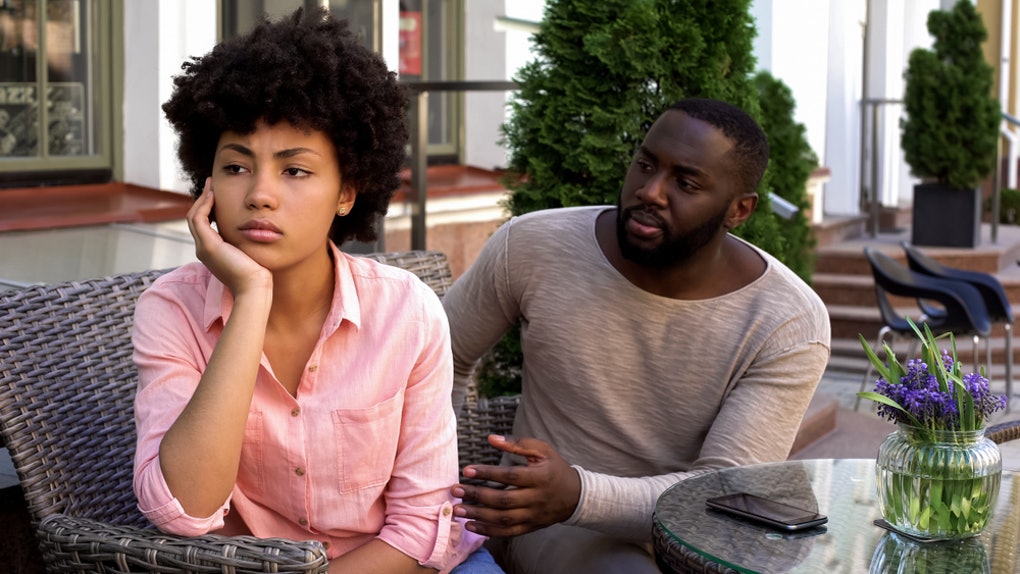:max_bytes(150000):strip_icc():format(webp)/young-woman-sitting-on-sofa--looking-at-distressed-man-at-table-74583142-5a7f74226bf06900374afa0a.jpg)
Please note: This article is not about the hurts that are caused by physical or emotional abuse in a marriage. If you are in a dysfunctional marriage that includes spousal abuse, please seek professional and legal help asap.
The Cycle of Hurt
A cycle that many married couples fall into when a hurt occurs in their marriage is to clam up about the issue, withdraw from one another, dwell too much on the hurt, hold onto a grudge, walk on eggshells around one another, dig in their heels on the issue, allow bitterness to build, and end up in a cold war and deep disillusionment.
The Secret
If you are hurt by something your spouse said or didn’t say or something your spouse did or didn’t do, in order to save your marriage, you must talk about the situation. One study found that one of the most common reasons people cited for divorce was not being able to talk to one another.1
According to Gerald Foley in Courage to Love … When Your Marriage Hurts, “Marriages often break down because of an accumulation of hurts from indifference, insensitivity, retaliation, physical abuse, criticism, nagging, or hurting the other to get attention. When we get hurt, the pain makes us turn in on ourselves, focusing on the pain rather than on the other person. The one who is hurt and the one who did the hurting both need healing.”
Negative feelings often tag along when you are hurt. These feelings can bring with them more hurtful thoughts. Without talking about what is going on inside of you, the hurt can continue to grow. Here is a list of feeling words to help you get started in learning how you feel:
- Denial
- Resentment
- Wounded
- Discouragement
- Anger
- Mistrust
- Beaten Down
- Alarmed
- Cold
- Loneliness
- Emptiness
- Attacked
- Used
- Lost
- Cautious
- Tired
- Broken
- Torn
- Defeated
- Scorned
- Rejected
- Defensive
Research suggests that being able to express negative emotions is associated with better relationship outcomes. Expressions of these negative feelings are linked to eliciting more support and a sense of heightened closeness and intimacy.2
Unintentional Hurts
Although unintentional hurts are really too numerous to list and what hurts one person won’t hurt another, here are some common ways couples hurt one another without meaning to cause pain.
- Being Thoughtless
- Forgetfulness
- Insensitivity
- Unkindness
- Hurtful Teasing
- Selfishness
- Controlling
- Silent Treatment
- Ignoring Your Spouse
- Apathy
Intentional Hurts
Intentional hurts are when you hurt your spouse, you know you are doing it, and you continue to do it. These hurts often occur in the midst of arguments, clashes with each other, and misunderstandings.
An example of creating an intentional hurt is if you decide to watch porn even though you know it is causing your spouse distress. Other ways you can intentionally damage your marriage include:
- Spending too much time on computer games, social media, volunteer tasks, or work
- Lying about your finances or having an affair
- Not being helpful with chores around the house or not being willing to take care of your children
- Avoiding talking about sex problems, in-law matters, friendship concerns, differences, and other unresolved issues3
- Showing a lack of respect for your spouse
- Sabotaging your marriage
- Being irresponsible
- Not keeping your promises
What You Should Do
Here are some positive approaches that can help heal the hurts in your marriage:
- Discover what causes the hurt
- Talk about it
- Listen to each other
- See a professional marriage counselor
- Be forgiving and let go of the hurt
Don’t leave things between the two of you said. If you do nothing when hurts occur, you will eventually drift apart. Don’t let emotional withdrawal become part of your marriage.
Experts Advice
“Talk to find answers rather than to blame or hurt your spouse … The reason to discuss problems is to find better ways to make the marriage work.” – H. Wallace Goddard, Kathleen Rodgers, Strengthening Your Marriage
“When we bury our conflicts instead of facing them, when we stuff our pain instead of dealing with it, a process is set in motion. You may think you get rid of conflict by burying it, but you are burying it alive and it will continue to haunt you. Avoidance will eventually lead you toward a place you don’t one to go: emotional divorce … The marriage dream you once shared will die a slow and painful death.” – Gary Rosberg, Barbara Rosberg, Healing the Hurt in Your Marriage
“Allow your partner to be imperfect. One wise lady said that she decided to allow her husband ten faults. When he did something that bothered her, she said, ‘Well, there’s one of his faults. I can live with it.'” – H. Wallace Goddard, Kathleen Rodgers, Strengthening Your Marriage
“One of the keys to a successful marriage is to appreciate the strengths. Every marriage has problems. But by using your strengths wisely you can continue to make the marriage stronger.” – H. Wallace Goddard, Kathleen Rodgers, Strengthening Your Marriage
“All couples face difficulties, and all couples have differences. These differences may center on money, in-laws, religion, or any other area of life … When one or both marriage partners insist on ‘my way or not at all,’ they are moving their marriage toward winter. Winter may last a month, or it may last thirty years.” – Gary Chapman. The 4 Seasons of Marriage: Secrets to a Lasting Marriage









